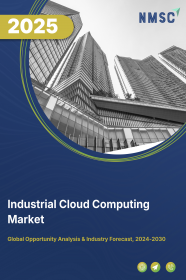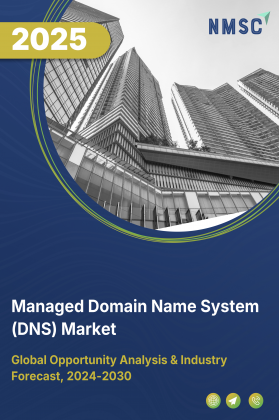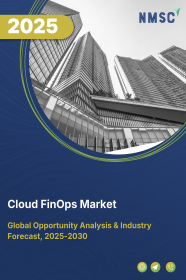
Industrial Cloud Computing Market by Type (Public Cloud, Private Cloud, Hybrid Cloud) by Service (Infrastructure as a Service (IaaS), Platform as a Service (PaaS), Software as a service (SaaS), By Organization Size (Large Enterprises, Small Enterprises, Medium Enterprises), and Others - Global Opportunity Analysis and Industry Forecast, 2024-2030
Market Definition:
The Industrial Cloud Computing Market size was valued at USD 311.75 billion in 2023 and is predicted to reach USD 1094.62 billion by 2030 with a CAGR of 17.10% from 2024-2030.
Industrial cloud computing refers to a broad idea of utilizing cloud technology to handle industrial processes and challenges across various industries such as manufacturing, mining & construction and waste & water management. It transmits, collects and store data using computers and mobile devices. Cloud computing uses internet connection to store software and information that are used in business operations and production processes.
Industrial cloud computing assists in gathering data from industrial processes to improve efficiency, acquire knowledge and predict obstruction. It also helps in standardized configurations, improves operational efficiency, deepens customer engagement and customized holistic solutions in organizations.
Market Dynamics and Trends:
Increasing adoption of cloud computing services in the industrial sectors and rising awareness of cloud computing that facilitates managing big data, handling large volume of information, flexibility, data storage and reduced cost have been driving the growth of industrial cloud computing market. Also, implementation of advanced technologies such as artificial intelligence, machine learning and 5G advancements enables industries for data integration, data segmentation and business intelligence is expected to further propel the growth of industrial cloud computing market.
Moreover, increasing government investments and initiatives have resulted into greater utilization of cloud computing in the industrial cloud computing market. For instance, in June 2022, Ministry of Education, All India Council for Technical Education (AICTE) and Amazon Web Services (AWS) worked together to conduct cloud computing and machine learning (ML) skills for students to strengthen and focus to build a future-ready digitally-skilled workforce in India.
However, increasing cases of data breaches & online cyber-attacks allied to cloud-based solutions and rising privacy concern are expected to restrain the growth of industrial cloud market during the forecast period.
On the contrary, rapid digitization and implementation of hybrid cloud computing services such as Amazon Web Services (AWS), Google Anthos, and Azure Stack in the industrial sector to benefit from cloud computing services are expected to create ample growth opportunities for the market in the coming years.
Market Segmentations and Scope of the Study:
The industrial cloud computing market is segmented on the basis of type, service, application, organization size, industry, and geography. On the basis of type, the market is divided into cloud, private cloud, and hybrid cloud. On the basis of service, the market is classified into infrastructure as a service (IaaS), platform as a service (PaaS), and software as a service (SaaS). On the basis of organization size, the market is categorized into large enterprises and small and medium enterprises. On the basis of application, the market is segmented into asset management, customer relationship management (CRM), enterprise resource management (ERM), supply chain management (SCM), project and portfolio management, business intelligence, database management, business analytics and others. On the basis of industry, the market is bifurcated into Banking, Financial Services and Insurance (BFSI), IT and telecommunications, retail and consumer goods, government and public sector, manufacturing, healthcare and life sciences, energy and utilities, media and entertainment, and others. Geographic breakdown and analysis of each of the aforesaid segments includes regions comprising of North America, Europe, Asia-Pacific, and RoW.
Geographical Analysis:
North America holds the lion share of industrial cloud computing market at present and is expected to continue its dominance during the forecast period. This is attributed to factors such as high adoption of cloud computing by several industries such as automotive industry, healthcare industry and financial industry in this region. Also, presence of major key players such as Microsoft Corporation, Amazon Web Services Inc., Cisco Systems Inc., Google and IBM Corporation introduce new services that boosts the market growth in this region.
For instance, in December 2021, Amazon Web Services announced expansion of Amazon S3 on Outposts into AWS GovCloud in US. This expansion allowed US government agencies and contractors to move sensitive workloads onto their AWS Outposts. Amazon S3 on Outposts helped to meet low latency, local data processing and data residency to Outpost on premises.
On the other hand, Asia-Pacific is expected to show a steady rise in the industrial cloud computing market due to the availability of skilled labor, government initiatives to increase usage of cloud computing and huge investment in Information Technology in countries including India and China.
For instance, in August 2021, Ministry of Electronics and Information Technology (MeitY), Government of India, announced Oracle as an empaneled cloud infrastructure solution provider to India’s public sector. This cloud infrastructure solution provider allowed Indian governments and public sector organization to move their most challenging workloads accelerating the country's goal of becoming a fully digitally empowered society. Moreover, rising focus towards digital transformation of the industries and developing economies are expected to drive the industrial cloud computing market growth in this region.
Competitive Landscape:
The industrial cloud computing market comprises of various market players such as Microsoft Corporation, Oracle Corporation, Amazon Web Services Inc., Google Inc., IBM Corporation, Adobe Systems Inc., Alibaba Group Holding Ltd., Alphabet Inc., SAP SE , Cisco Systems Inc. These market players are adopting various strategies such as joint venture and collaborations of business across various regions to maintain their dominance in the industrial cloud computing market.
For instance, in June 2022, Microsoft Corporation and Procter & Gamble Company(P&G) announced a multiyear collaboration that used Microsoft Cloud to support P&G's transition to digital manufacturing. These two companies co-innovated to accelerate and expand P&G’s digital manufacturing platform and leverage Industrial Internet of Things (IIoT) to raise productivity by lowering costs and increase customer satisfaction. Moreover, in June 2022, Alibaba cloud services announced joint venture with Saudi Telecom Co and eWTP Arabia Capital to step up its overseas expansion.to deliver a wide range of public cloud services to help small and medium-sized businesses and major corporations across a variety of industries and accelerate their digitalization activities.
Key Benefits:
-
The industrial cloud computing market report provides the quantitative analysis of the current market and estimations through 2022-2030 that assists in identifying the prevailing market opportunities to capitalize on.
-
The study comprises a deep dive analysis of the industrial cloud computing market trend including the current and future trends for depicting the prevalent investment pockets in the market.
-
The information related to key drivers, restraints and opportunities and their impact on the industrial cloud computing market is provided in the report.
-
The competitive analysis of the market players along with their market share in the industrial cloud computing market.
-
The SWOT analysis and Porters Five Forces model is elaborated in the study.
-
Value chain analysis in the market study provides a clear picture of the stakeholders’ roles.
Key Market Segments:
By Type
-
Public Cloud
-
Private Cloud
-
Hybrid Cloud
By Service
-
Infrastructure as a Service (IaaS)
-
Platform as a Service (PaaS)
-
Software as a service (SaaS)
By Organization Size
-
Large Enterprises
-
Small Enterprises
-
Medium Enterprises
By Application
-
Asset Management
-
Customer Relationship Management (CRM)
-
Enterprise Resource Management (ERM)
-
Supply Chain Management (SCM)
-
Project and Portfolio Management
-
Business Intelligence
-
Database Management
-
Business Analytics
-
Others
By Industry
-
Banking
-
Financial Services and Insurance (BFSI)
-
IT and Telecommunications
-
Retail and Consumer Goods
-
Government and Public Sector
-
Manufacturing
-
Healthcare and Life Sciences
-
Energy and Utilities
-
Media and Entertainment
-
Others
By Geography
-
North America
-
U.S
-
Canada
-
Mexico
-
-
Europe
-
UK
-
Germany
-
France
-
Italy
-
Spain
-
Rest of Europe
-
-
Asia-Pacific
-
China
-
India
-
Japan
-
South Korea
-
Australia
-
Rest of Asia-Pacific
-
-
RoW
-
UAE
-
Saudi Arabia
-
South Africa
-
Brazil
-
Remaining countries
-
Key Players
-
Microsoft Corporation
-
Oracle Corporation
-
Amazon Web Services Inc.
-
Google Inc.
-
IBM Corporation
-
Adobe Systems Inc.
-
Alibaba Group Holding Ltd.
-
Alphabet Inc.
-
SAP SE
-
Cisco Systems Inc.




















 Speak to Our Analyst
Speak to Our Analyst
























